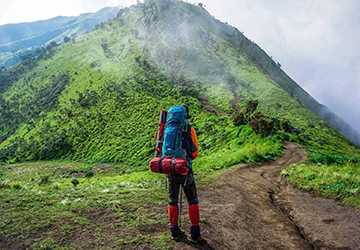10 Sustainable Ways to Explore the Great Outdoors
Rejuvenating through exploration and spending time in nature is much-needed healing for everyone. In the face of extreme climate change, increased pollution, and plastic consumption, awareness of the consequences of our actions on nature has become imperative. It is essential to find more sustainable ways of living and adopt sustainable exploration methods to preserve the beauty of nature and the planet's ecological health.
Whether hiking, camping, or simply enjoying a picnic in the park, there are ways you can be more environmentally friendly, minimize your environmental impact, and reduce your carbon footprint.

Here are ten ways to go green while exploring the great outdoors:
1. Choose environmentally friendly means of transportation
One of the first ways to live sustainably is to minimize your ecological impact by choosing eco-friendly vehicles when exploring the great outdoors. When your destination is within reach, walk or bike. This allows you to enjoy the scenery while reducing your carbon footprint.
When it's time to drive, you can carpool with others to reduce pollution, and you'll also save on fuel bills and limit other vehicle expenses. Another sustainable option is public transportation; sit back, relax, and enjoy the scenery without the hassle of driving.
Choosing eco-friendly transportation options like this allows you to enjoy the great outdoors while protecting the environment.
2. Respect wild animals
When you enter nature, remember entering someone else's home - the kingdom of wild animals. Respect their habitat and don't leave any traces of litter, litter or litter, etc. Keeping a safe distance from wild animals and avoiding direct interaction is also essential. Please do not feed or touch them, as this can disrupt their natural behavior and damage their health.
3. Take the specified route
Remember, these trails have been carefully designed to preserve the area's natural beauty. A great way to go greener is to stick to approved courses and resist the temptation to stray off the beaten path. Deviations from designated routes can cause irreversible damage to fragile ecosystems, disturbing flora and fauna and causing erosion. So we lace up our hiking boots and hit the trails, leaving nature untouched for future generations.
4. Open your litter box
Leaving trash outside can be harmful to nature and its inhabitants. Make sure you watch your waste. Remember to pack everything you bring and take away any excess debris. If you come across litter along the way, take the time to clean it up and dispose of it properly.
5. Use reusable water bottles and containers
Single-use plastics are a significant cause of environmental degradation, and we must take steps to reduce our reliance on these harmful materials. One of the ways to adopt a zero-waste lifestyle and reduce waste is to bring our refillable water bottles and containers. This will eliminate the need for single-use plastics and reduce our carbon footprint.
So before you embark on your next adventure, pack your refillable water bottles and other reusable containers to protect the environment and its many inhabitants.
6. Choose sustainable gear
To make sustainable choices when buying new outdoor gear, look for products made from environmentally friendly materials like recycled fabrics or biodegradable materials. Before your next purchase, take some time to research eco-friendly options and choose products that align with your values and commitment to sustainability.

7. Support local businesses
Why should you consider supporting your local community by supporting local businesses when planning your next outdoor adventure? Buying meals and supplies from nearby stores helps boost the local economy, reduces traffic emissions, and is an excellent tip for adopting a zero-waste lifestyle.
By sourcing locally, we reduce our carbon footprint and contribute to the growth and development of our communities. So before you embark on your next adventure, take the time to research local businesses and support them by making eco-friendly choices. Not only will you positively impact the environment, but you'll also have the opportunity to connect with the people and culture of the region you're exploring.
8. Leave no trace
The Leave No Trace Principle is an invaluable guide and top tip for anyone wishing to explore nature responsibly and ethically and to achieve a zero-waste lifestyle. Essentially, this concept encourages us to minimize our environmental impact by fully preserving the areas we find. This means not disturbing the natural environment, respecting local wildlife and ecosystems, and being considerate of other visitors.
9. Save water
Conserving water when traveling is an essential step towards sustainable tourism. Here are some tips for saving water while traveling:
l Take shorter showers: take shorter showers to save water, and you can also turn off the water when lathering and washing your hair.
l Use a low-flow shower head: If you live where there are showers, ask if there are low-flow shower heads. This will help reduce water usage during storms.
l Reuse towels: Instead of changing them daily, hang them up to dry and reuse them, saving water and energy.
l Use a facecloth or sponge to clean: When cleaning, use a facecloth or sponge to wash dishes or wipe surfaces, not running water.
10. Educate others
Finally, remember to spread the word about sustainable adventure and educate others on ethical behavior in the great outdoors. Lead by example and ensure your family and friends understand the importance of sustainable practices.
Diploma
When exploring the great outdoors, preserving the natural environment for future generations is essential. By following these simple guidelines, you can enjoy the great outdoors and reduce your impact on the planet. To enjoy nature and the natural form of the ocean for as long as possible, we must take responsibility for the ecology conservation. Remember, there are more than a dozen ways to go green, so learn, explore, and educate yourself for the good of the planet.





